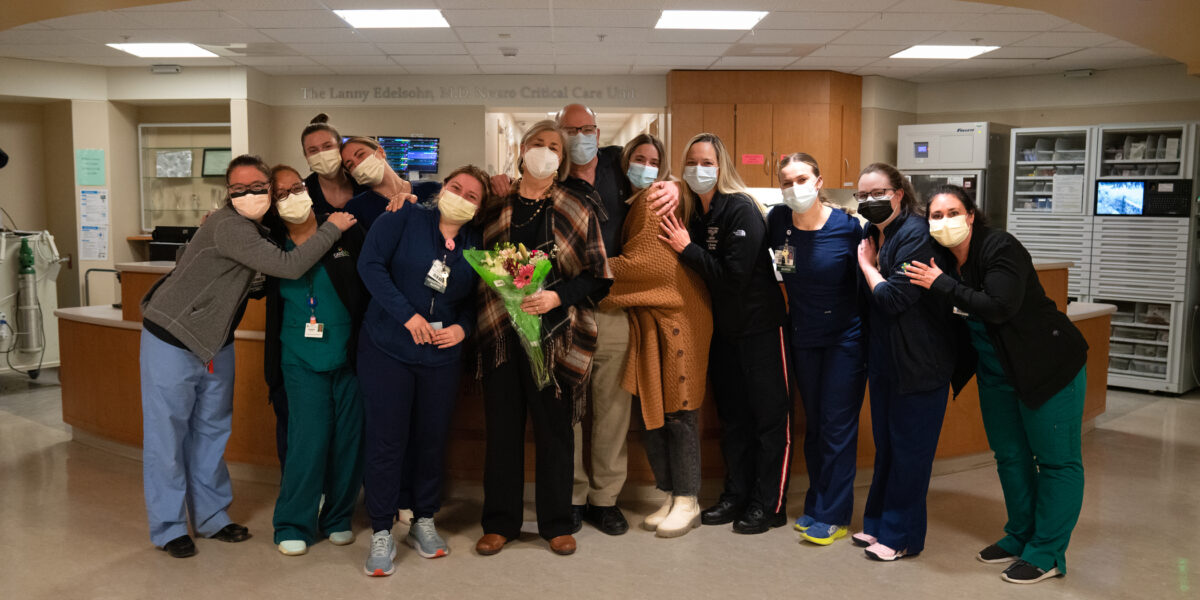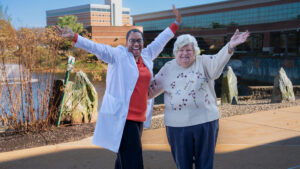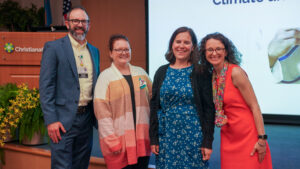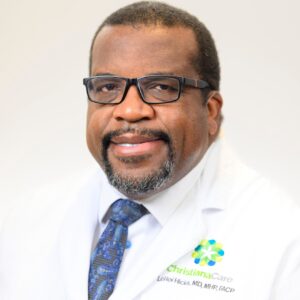One year after she arrived comatose by helicopter after a blood vessel ruptured in her brain, Gretchen Dejter walked without assistance into Christiana Hospital to personally thank the people who saved her life.
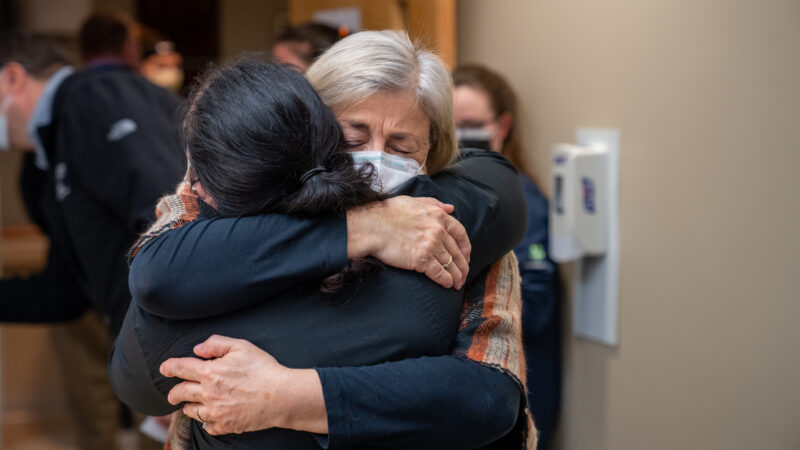
She wrapped caregivers in tight hugs, smiling as she wiped away tears. With each embrace, she pressed a small keepsake into each of their hands — a card with a picture of a starfish and a story about how one person can make a difference.
Names and faces were a blur, like most of Gretchen’s memories during the month she spent in the hospital, but she and her family will never forget the team of doctors, nurses, therapists and other professionals who made her recovery their goal.
The speed of the flight team that brought her 90 miles from her home on the Eastern Shore.
The lifesaving work of the surgeons who stopped the bleeding caused by a ruptured aneurysm.
The small kindnesses of the nurses who braided her hair and talked to her as they monitored her progress.
These all were signs to Gretchen and her family that she was meant to be at Christiana Hospital, even if they had never heard of ChristianaCare before her aneurysm.
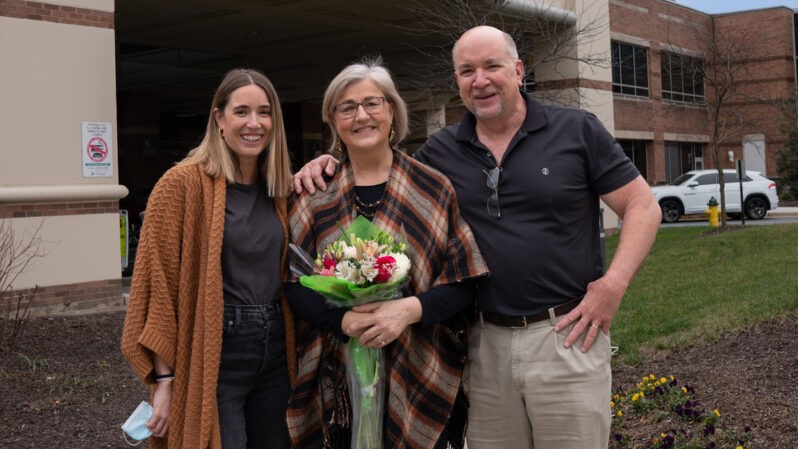
Do you have our next Thank You Project? If you or someone you know has had an exceptional experience at ChristianaCare, contact Patient Experience at 302-733-1379.
The family’s happy return to Delaware was coordinated by the Thank You Project, a program of the Center for Worklife Wellbeing and Patient Experience that reunites patients with their caregivers and care teams at ChristianaCare to express their gratitude.
Beyond the hugs and handshakes and pleasantries of the medical reunion is a personal experience that means as much to caregivers as it does to the patients.
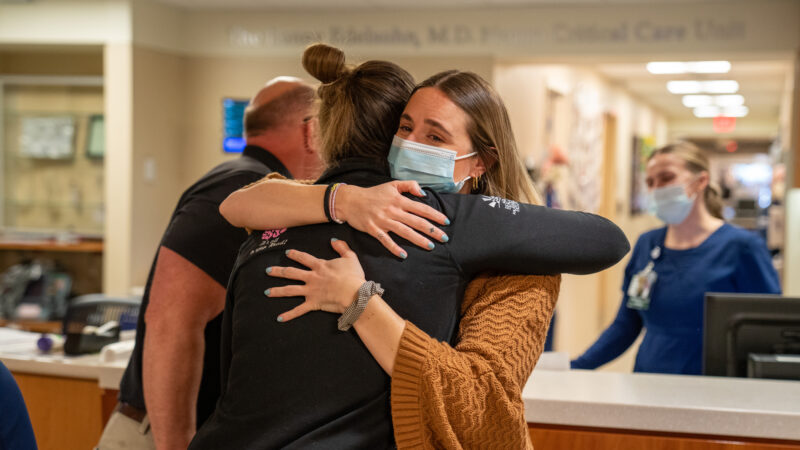
“We see our patients with all the things — lines, vents, IV tubing neatly packaged around them — so to see her for who she truly is, with normal clothes and such a steady gait, was really amazing,” said Anice Henkel, BSN, RN. who works on the Neuro Critical Care Unit.
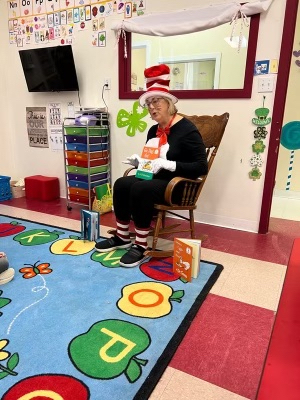
She was one of about 30 caregivers, including nurses, patient care technicians, physicians, flight team members, case managers and others who gathered for the event.
“Hearing her gratitude made me feel like the job I do makes a difference. It subdued any doubts or burnout I had in my mind.
“In complete honesty, it made me cry happy tears.”
From bad timing to good luck
When Gretchen’s aneurysm ruptured in March 2022, blood spilled into her subarachnoid space, the area between her brain and the surrounding membrane. Many who experience this brain emergency – also known as a subarachnoid hemorrhage – die instantly. Of those who survive long enough to get to the hospital, only one-third return to their original level of function.
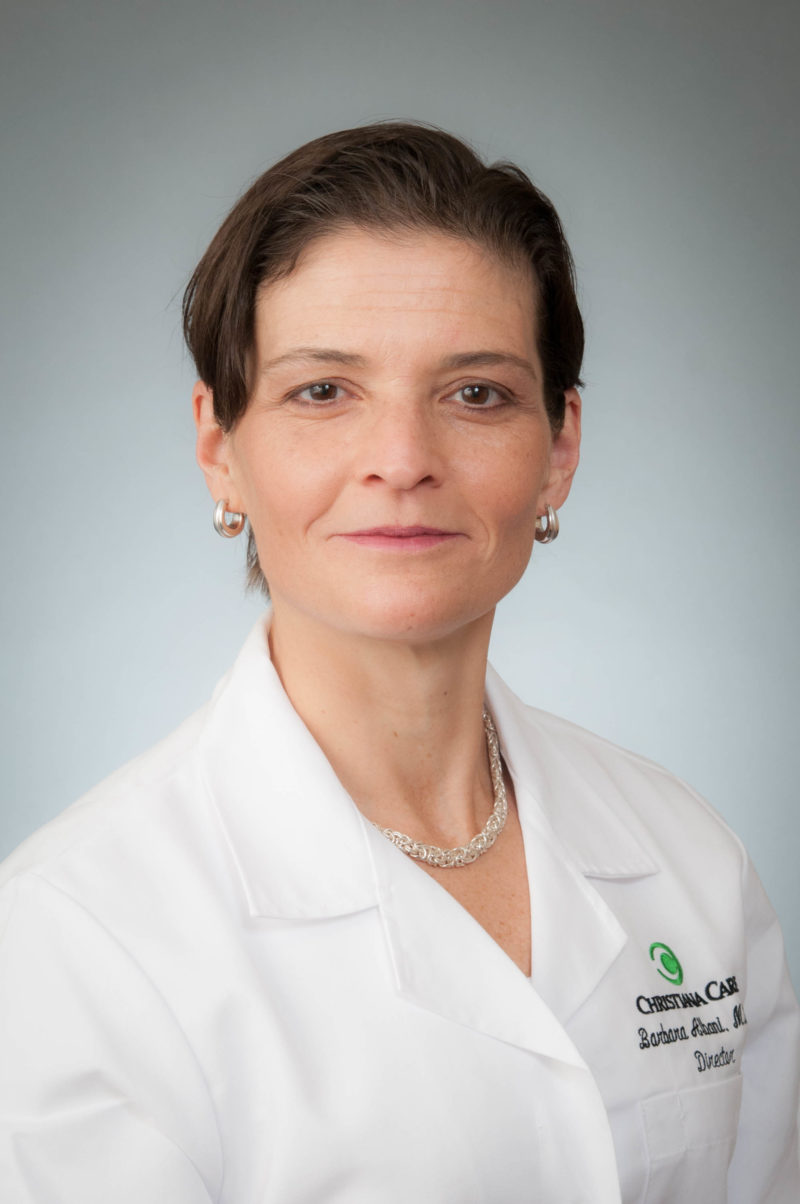
What seemed like bad timing — that other facilities closer to home were too full — turned out to be a ray of good luck. ChristianaCare is home to one of the best and busiest stroke centers in the country and has been recognized as a Comprehensive Stroke Center by The Joint Commission, the most advanced level of expertise in stroke care.
ChristianaCare’s recognized expertise in stroke and other neurological emergency care reflects the highly skilled caregivers who work across the system, including those in the emergency departments, intensive care and critical care units, and the ChristianaCare Center for Heart & Vascular Health, said Barbara Albani, M.D., medical director of NeuroInterventional Surgery at ChristianaCare, an expert in neurology, radiology and neuroradiology.
“We have the results we do because of the team we have here,” said Albani, who treated Gretchen Dejter.
To improve Gretchen’s odds of recovery, surgeons inserted an endovascular device at the aneurysm to stop the bleeding. The woven mesh device, resembling a skein of yarn, was threaded through a small incision in Gretchen’s groin. Its job was simple: Block blood flow to the affected area in her brain.
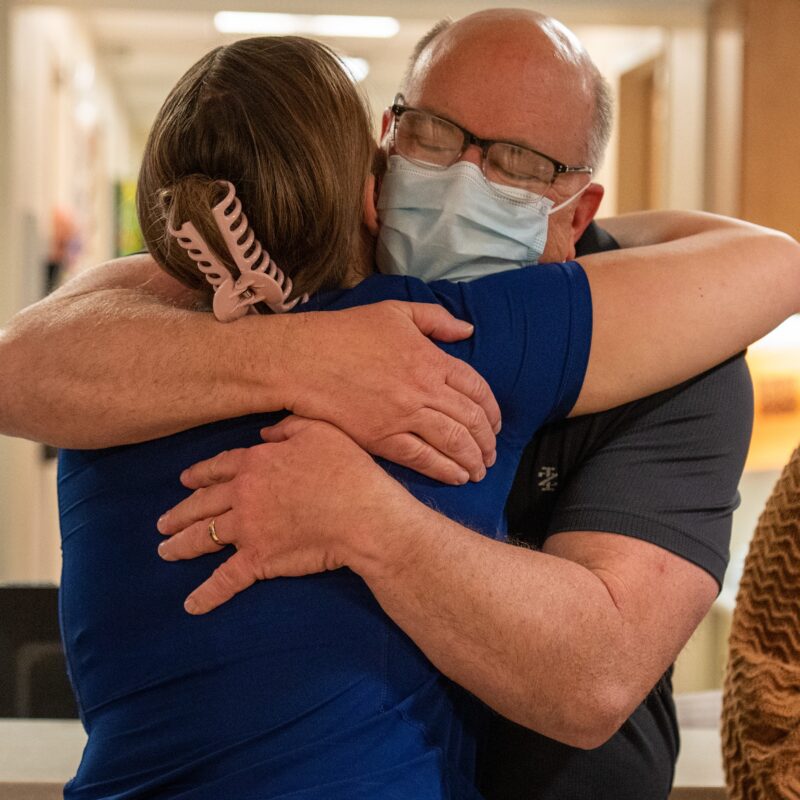
“Literally, we didn’t know if she was going to be able to ever come back to our home again,” Rob said.
“We were just saying, ‘God, whatever you give us of Gretchen we will take and be grateful for that.’
“We all just agreed that whatever capacity Mom can come back in, we’re going to accept and we’re going to run with it.”
‘Like we were the only ones on the floor’
From the beginning, the family was amazed at how the surgical team navigated Gretchen’s complicated case. Just as exceptional was their focus on her as a person.
Rob remembers talking with Richard Choi, D.O., medical director of the Neurocritical Care Unit, in the early days after her surgery. Choi asked about Gretchen’s interests, her work and the kind of things that made her happy.
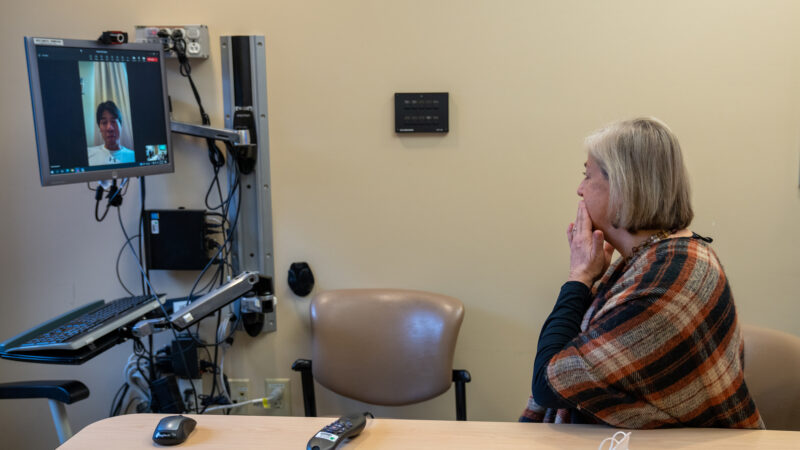
“He wanted to know Gretchen the person and that just meant so much,” Rob said.
“Despite there being critically ill people all over the unit, we felt like we were the only ones on the floor.”
As a nurse in the Neuro Critical Care Unit, Henkel understands what it means to make families feel a little more at home in their unfamiliar surroundings. She often stacks her shifts to ensure continuity of care and help families make this time of chaos a little more manageable.
“Nurses get the opportunity to make small differences in people’s lives,” Henkel said.
“As a part of the hospital staff, we are here 24/7, so the tan walls and loud noises of alarms don’t have much effect on us. To a patient or family member, that can be really intimidating and scary.”
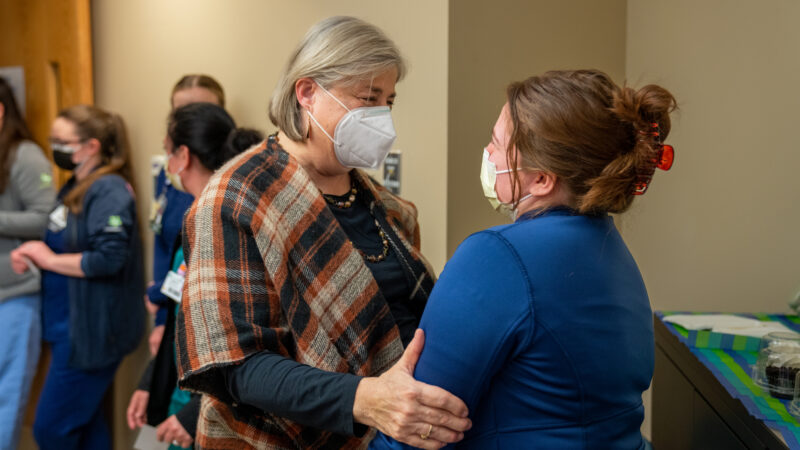
For Megan, those gestures made feel like her mom was in the best hands possible.
“I felt like I was leaving her with my best friends. They were so sweet and so caring,” said Megan, who works as a mental health professional.
“We thank God every day that we ended up here. It was worth all the drives.”
Celebrating gratitude
More than a year later, Gretchen marvels at all she has regained. Progress isn’t always at the pace she would like, but she is back to driving and catching up with loved ones — and grateful for those who made it possible.
“Hearing Gretchen’s gratitude made me feel like the job I do makes a difference. It subdued any doubts or burnout I had in my mind.
“In complete honesty, it made me cry happy tears.”
— Anice Henkel, BSN, RN
That was the feeling she hoped to convey during her return visit to Christiana Hospital.
For Choi, the sight of Gretchen brought an unexpected wave of emotion. Their reunion was held virtually, as he was unable to make her meeting in person.
“In all honesty, I didn’t even realize Gretchen was the patient when I first met her on the screen,” Choi said.
“I think seeing how well she’s done, despite how sick she was when she first came in, is so powerful. We don’t frequently have the opportunity to validate the work that we do.
“This reminds us that the hours we spend here and the time we give is meaningful, and not just to us.”
Do you have our next Thank You Project? If you or someone you know has had an exceptional experience and would like to say “thank you,” contact Patient Experience at 302-733-1379 or email Natalie Dyke at ndyke@christianacare.org.
To learn more about the Center for WorkLife Wellbeing and the work they do to support caregivers, visit here.
.
”
